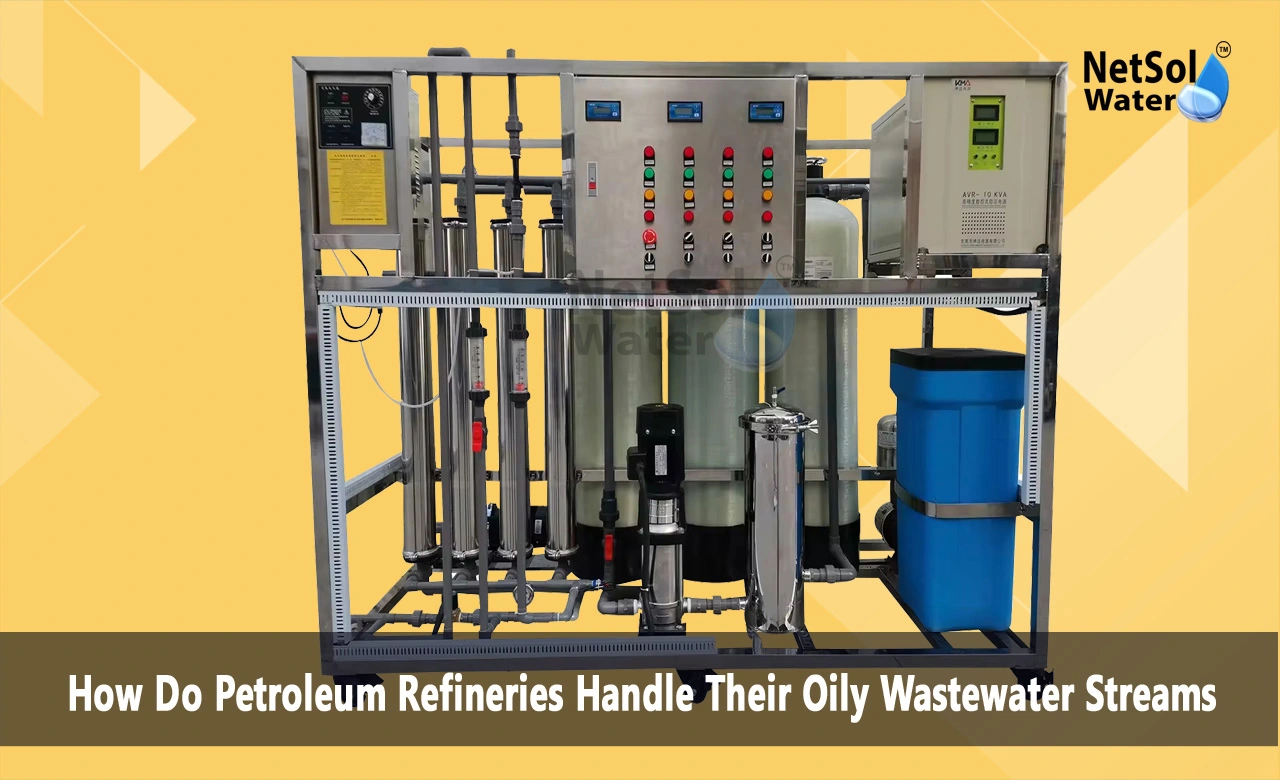How Do Petroleum Refineries Handle Their Oily Wastewater Streams?
Petroleum refineries produce large volumes of oily wastewater during operations like desalting, cooling, and equipment cleaning. This wastewater carries various contaminants such as hydrocarbons, dissolved salts, suspended solids, and other organic and inorganic compounds. Properly treating this wastewater is important for environmental protection and meeting regulations. One efficient solution for managing oily wastewater streams is to use commercial RO plants.
Understanding Oily Wastewater in Petroleum Refineries
Sources of oily wastewater: Desalting, cooling water blowdown, equipment cleaning, and other refinery processes contribute to the generation of oily wastewater.
Composition of oily wastewater: The wastewater contains various contaminants, including hydrocarbons (such as crude oil, gasoline, and diesel), dissolved salts, suspended solids, and organic compounds like phenols and acids.
Environmental concerns: Untreated oily wastewater can have detrimental effects on the environment, including water pollution, soil contamination, and harm to aquatic life.
Conventional Treatment Methods for Oily Wastewater
Before discussing commercial RO plants, let's briefly review the conventional methods used for treating oily wastewater in petroleum refineries.
Primary treatment: This stage involves physical separation techniques like oil-water separators, skimmers, and dissolved air flotation units to remove free-phase oil and suspended solids.
Secondary treatment: Biological treatment processes, such as activated sludge systems or bioreactors, are used to degrade organic compounds present in the wastewater.
Tertiary treatment: Additional processes like chemical precipitation, filtration, and adsorption may be employed to remove residual contaminants and meet discharge standards.
Introduction to Commercial RO Plants
Reverse osmosis (RO) technology: RO is a membrane-based separation process that removes dissolved salts, organic compounds, and other contaminants from water by applying pressure to force the water molecules through a semi-permeable membrane, leaving the contaminants behind.
Advantages of commercial RO plants: High removal efficiency of dissolved salts and organic compounds, compact footprint, low energy consumption, and potential for water reuse.
Commercial RO plant components: Pre-treatment systems (e.g., multi-media filters, activated carbon filters), high-pressure pumps, RO membrane modules, and post-treatment systems (e.g., disinfection, remineralization).
Pre-treatment Processes in Commercial RO Plants
Effective pre-treatment is crucial for the successful operation of commercial RO plants. In this section, we'll explore the various pre-treatment processes employed to prepare oily wastewater for RO treatment.
Screening and grit removal: Coarse screening and grit chambers are used to remove large debris and grit particles that could damage downstream equipment.
Oil-water separation: Gravity separators, dissolved air flotation units, or coalescing plate separators are employed to remove free-phase oil and suspended solids from the wastewater stream.
Chemical treatment: Coagulants and flocculants may be added to enhance the removal of suspended solids and emulsified oils through flocculation and sedimentation processes.
Multimedia filtration: Multi-media filters, consisting of layers of different filter media (e.g., sand, anthracite, and garnet), are used to remove residual suspended solids and colloidal particles.
Activated carbon filtration: Granular or powdered activated carbon filters are used to adsorb residual organic compounds, including hydrocarbons and other dissolved organics.
RO Membrane Treatment and Post-treatment Processes
RO membrane treatment: The pre-treated wastewater is fed into the RO membrane modules, where high pressure is applied to force the water molecules through the semi-permeable membranes, leaving behind dissolved salts, organic compounds, and other contaminants.
Membrane cleaning and maintenance: Regular cleaning and maintenance of the RO membranes are essential to maintain their performance and prolong their lifespan.
Concentrate management: The concentrated waste stream from the RO process, containing the rejected contaminants, requires proper disposal or further treatment.
Post-treatment processes: The treated water from the RO process may undergo additional post-treatment steps, such as disinfection (e.g., chlorination or UV treatment) and remineralization (adding minerals to adjust the water quality for specific applications).
Applications and Benefits of Commercial RO Plants
Water reuse and recycling: The treated water from commercial RO plants can be reused for various refinery processes, such as cooling water makeup, boiler feedwater, or even potable water supply, reducing the overall water consumption.
Environmental compliance: Commercial RO plants enable petroleum refineries to meet stringent discharge standards and minimize the environmental impact of their oily wastewater streams.
Cost savings: Water reuse and reduced discharge fees can lead to significant cost savings for petroleum refineries.
Reduced disposal costs: By treating and reusing the oily wastewater, commercial RO plants help reduce the costs associated with off-site disposal or treatment of untreated wastewater.
Conclusion
Commercial RO plants provide a reliable and eco-friendly answer for managing oily wastewater streams in petroleum refineries. Through a combination of different pre-treatment processes and advanced RO membrane technology, these plants efficiently eliminate various contaminants, such as hydrocarbons, dissolved salts, and organic compounds. The treated water can then be reused for different refinery operations, cutting down overall water usage and lessening environmental impact. Though commercial RO plants demand careful planning, operation, and upkeep, their advantages, including water reuse, adherence to environmental standards, and cost-effectiveness, make them an appealing investment for petroleum refineries committed to responsibly managing their oily wastewater streams.
Do you need an advice or assistance on selecting the best water and waste water treatment unit? We have solutions for all your problems!
Let us know your problem, our experts will make sure that it goes away.
For an assistance or related query,
Call on +91-965-060-8473 Or write us at enquiry@netsolwater.com



